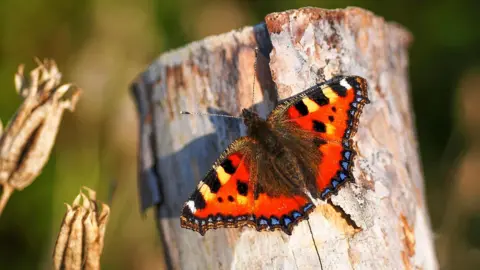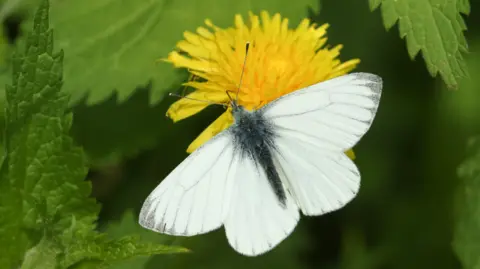More than half of the butterfly species of England in a long -term decline

BBC News
 Gilles San Martin
Gilles San MartinIn a survey, more than half of the British butterfly species had a long -term decline.
British butterfly monitoring scheme, 31 of the 59 species since 1976, the numbers have started to watch, he said.
In addition, 2024 was the fifth worst year for the number of butterflies throughout the country, and except for eight species, all of them have decreased in the previous year-However, populations can fluctuate annually in response to the weather.
Dr. Richard Fox, the Head of the Butterfly Protection Science, said that the long -term decline is “completely the way people manage the landscape”.
Many butterfly species showed a population decline last year, while nine people broke their worst years of record – Grizzled Captain, Encrypted Wooden White and Chalk Hill Blue saw sharp drops compared to the previous year.
However, it has been found that 22 species have significant losses since the monitoring began.
Among them, there was a small turtle shell butterfly that has fallen by 86% in the last 49 years, and the green -veined white butterfly decreased 28%.
The common butterflies living in gardens, parks and rural areas had the worst year of the second year in 2024. Since 2023, only the number of six species has increased.
Dr Fox said that the falling butterfly numbers are due to the use of pesticides and other pollutants as well as the “destruction of rich habitats in terms of wildlife”.
 Getty Images
Getty ImagesButterflies added that it serves as an important indicator of the environment for people.
“When the butterflies fall, we know that there are big problems around us,” BBC Radio 4 told the Today. He said.
Butterfly populations fluctuate annually in response to the weather. The study said that the low numbers of 2024 were partially from a wet spring and then a relatively cool summer.
However, Dr. Fox said that climate change means that the unusual air has become more frequent.
“When we have bad weather, these already exhausted butterfly populations are extremely vulnerable, and he can’t go back like once,” he said.
Dr Fox said that the change was recycled and called on people to allow people to grow wild growth and grass in the summer months – because he increased the number and diversity of butterflies.
The program asked volunteers to count butterfly in 3,552 regions in the UK.





